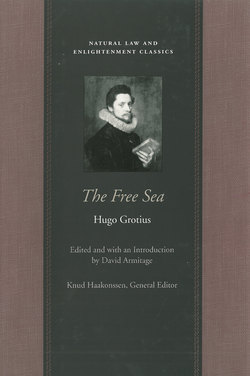Читать книгу The Free Sea - Hugo Grotius - Страница 14
На сайте Литреса книга снята с продажи.
ОглавлениеCHAPTER 2
That the Portugals have no right of dominion over those Indians to whom the Hollanders
sail by title of invention
But that the Portugals are not lords of those parts whither the Hollanders go—to wit, of Java, Tabrobana1 and the greatest part of the Moluccas—we gather by a most certain argument, because no man is lord of that thing which neither he himself ever possessed nor any other in his name. These islands we speak of have, and always had, their kings, their commonwealth, their laws and their liberties. Trading is granted to the Portugals as to other nations; therefore, when they both pay tribute and obtain liberty of trade of the princes, they testify sufficiently that they are not lords but arrive there as foreigners, for they do not so much as dwell there but by entreaty. And although title be not sufficient for dominion, because possession also is required, seeing it is one thing to have a thing, another to have right to obtain it, yet I affirm that the Portugals have not so much as a title of dominion over those parts, which the opinion of the doctors (and those Spaniards) will not take from them.
First, if they will say those countries appertain unto them for a reward of the finding, they shall speak nor law nor truth, for to find is not to see a thing with the eyes but to lay hold of it with the hands, as in the epistle of Gordianus is declared.2 Whence the grammarians use the words invenire and occupare for words of one signification, and all the Latin tongue saith, “we have found that which we have gotten,” the contrary whereof is to lose.3 Moreover, even natural reason itself and the express words of the laws and the interpretation of the most learned show that such a finding sufficeth to get title of common as is joined with possession:4 to wit, movable things are laid hold on or immovable things are bounded and guarded,5 which in this kind can no way be said, for the Portugals have no garrisons there. How can it be said by any means that the Portugals have found out India which was so famous many ages since, even from the time of Horace?6
impiger extremos currit mercator ad Indos
per mare pauperiem fugiens. 7
How exactly have the Romans described many things unto us of Taprobane?8 Now, as touching the other islands, not only the borderers, the Persians and Arabians, but the Europeans also (especially the Venetians), knew them before the Portugals.
Besides, the finding of them gives no right but in that which was no man’s before their finding.9 But the Indians, when the Portugals came unto them, although they were partly idolaters, partly Mahometans, and entangled in grievous sins, yet had they both publicly and privately authority over their own substance and possessions which without just cause could not be taken from them.10 So with most sound reasons (following other authors of greatest account) the Spaniard Victoria concludeth, “Secular or ecclesiastical Christians,” saith he, “cannot deprive infidels of their equal power and sovereignty for that color only because they are infidels, unless some injury proceeded from them before.”11 “For faith,” as Thomas saith well, “doth not take away natural or human law from whence dominion proceedeth; nay, it is a point of heresy to believe that infidels are not lords of their own goods, and to take from them their goods which they possess for this very cause is theft and robbery no less than if the same be done to Christians.”12
Victoria therefore rightly saith that the Spaniards got no more authority over the Indians for this cause than the Indians had over the Spaniards if any of them had come formerly into Spain. Nor truly are the Indians out of their wits and unsensible but ingenious and sharp-witted, so that no pretence of subjecting them may be taken from hence, which notwithstanding by itself is sufficient manifest iniquity.13 Plutarch long since calleth it πρόϕασιν πλεονεξίας ἡμερώσαι τὰ βαρβαρικά, to wit, a wicked desire of that which is another’s, to pretend this color to himself that he may tame the barbarians.14 And now also that color of bringing the gentiles against their will to a more civil kind of behavior, which the Grecians in times past and Alexander used, is thought wicked and impious of all divines, but specially the Spaniards.15
